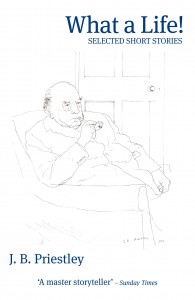J.B. Priestley
From the 1920’s to the 1970’s J.B. Priestley was one of Britain’s most popular, influential and prolific writers. What A Life! displays the generosity of spirit, and moral integrity, J.B. Priestley displayed throughout his life.
John Boynton Priestley was born in 1894 in the suburb of Manningham, Bradford. He left Belle Vue High School at the age of 16 to go into the wool business, working as a clerk for Helm & Co, and his first newspaper columns were published while he was a teenager, in the ‘Bradford Pioneer’ (the weekly journal of Bradford’s Labour Party).
Once World War One broke out Priestley joined the West Riding Regiment and served throughout the war. He was wounded three times, served on the Western Front and in the Battle of Loos, and in 1917 he was commissioned as an officer before injuries sustained in a gas attack led him to be classified as unfit for active service. After the War, Priestley studied at Trinity Hall, Cambridge, and on leaving university his career as a professional writer began. His first book, ‘Brief Diversions’, appeared in 1922, by then he was publishing widely in the Spectator, Times Literary Supplement and a range of newspapers. The Town Major of Miraucourt is Priestley’s only fictional account of his experiences of WW1, years that were central to his life and writing, capturing the voice of the common soldier.
Priestley’s third novel ‘The Good Companions’ was published in 1929 and within a few months became a publishing sensation, as well as being awarded the James Tait Black Memorial Prize. In the 1930’s he began to write plays that would become staples of the West End theatre. During World War Two Priestley presented the BBC Radio programme Postscript, which drew audiences of up to 16 million and led Graham Greene to describe Priestley as “a leader second only in importance to Mr Churchill”.
Priestley’s most famous play ‘An Inspector Calls’ appeared in 1945, it is still produced all over the world. In November 1957 a Priestley article for the New Statesman attacked Aneurin Bevan’s policy of abandoning unilateral nuclear disarmament, so many people wrote to the magazine supporting Priestley’s views that Kingsley Martin, the editor of the New Statesman, organised a meeting where the Campaign for Nuclear Disarmament (CND) was formed.
In 1960 Priestley published ‘Literature and Western Man’, a major survey of Western literature from the fifteenth-century to his own time. In 1977 he accepted the Order of Merit. J.B. Priestley died on August 14th 1984.
In the autumn of 1918, invalided out of the front line, an officer is ordered to company headquarters. On his journey he stumbles into Miraucourt, a village that seems to have slipped outside history: “somewhere, beyond the darkening bosom of those hills, there was a war, but it seemed incredibly remote, the wildest rumour of violence and sudden death.” There are a strange group of English soldiers stationed in Miraucourt, could they be Shakespeare’s Falstaff and Pistol, Bardolph and Nym?
In this unsettling story a soldier comes to terms with the War “like a man sharing a house, year after year, with a lunatic.”




